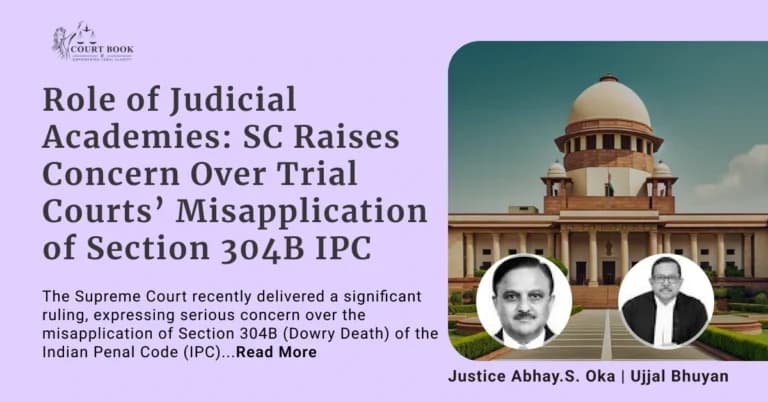The Supreme Court recently delivered a significant ruling, expressing serious concern over the misapplication of Section 304B (Dowry Death) of the Indian Penal Code (IPC) by trial courts. Despite repeated clarifications of this provision, lower courts continue to make the same mistakes. In this context, the role of judicial academies has been highlighted as crucial.
Case Background
This case pertains to Karan Singh v. State of Haryana, where the accused was convicted under Section 304B IPC and sentenced to eight years of rigorous imprisonment. The High Court upheld the conviction. The accused challenged this decision before the Supreme Court.
Read Also:- S.34 IPC | Prior Agreement Required for Common Intention: Supreme Court Ruling
Section 304B IPC: Definition of Dowry Death
In its ruling, the Supreme Court outlined the essential requirements of Section 304B IPC:
- Unnatural Death – The woman’s death must have been caused by burns, bodily injuries, or occurred under unnatural circumstances.
- Within Seven Years of Marriage – The death must have occurred within seven years of marriage.
- Harassment Related to Dowry – The deceased must have been subjected to harassment or cruelty for dowry demands shortly before her death.
Additionally, under Section 113B of the Indian Evidence Act, it must be proven that the woman was harassed for dowry just before her death for the presumption to apply.
Read Also:- Kerala High Court Asserts: Elected Representatives Must Resign to Change Political Affiliation
The Supreme Court found that both the trial court and the High Court overlooked key deficiencies in the prosecution’s case:
- Mother’s Statement: The deceased’s mother gave three different statements, which contained several contradictions.
- Brother’s Statement: Initial statements did not clearly mention any dowry demand.
- Uncle’s Statement: The deceased’s uncle made allegations later, but failed to provide concrete evidence.
The Court noted that these statements lacked credibility and appeared to be fabricated later.
The Supreme Court categorically stated:
“Trial courts are repeatedly misinterpreting Section 304B IPC. It is time for State Judicial Academies to intervene and provide proper training to judges. Perhaps, this was a case of moral conviction.”
The Court allowed the appeal and acquitted the accused.
This ruling emphasizes that judges must thoroughly examine cases and avoid convicting individuals without strong evidence. The role of judicial academies in training judicial officers is critical to preventing such errors in the future.
Through this ruling, the Supreme Court has set an important precedent regarding the misuse of Section 304B IPC. It underscores the need for judicial academies to step in and ensure that trial courts do not continue to make the same errors.















